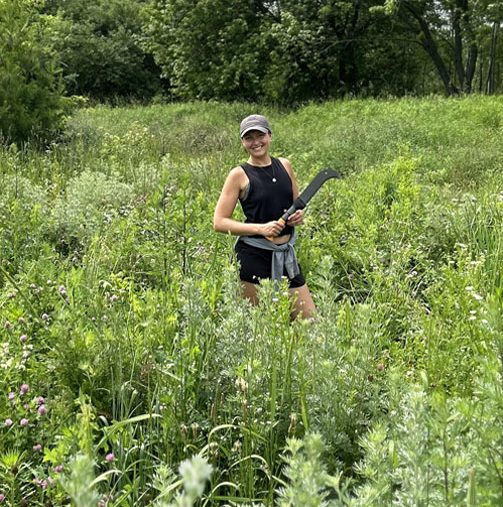It takes a village. A “Whole Village”
For my field trip experience while attending the Integrated Holistic Nutrition Program, I chose to explore a permaculture farming experience with the Whole Village farm and community. Whole Village is a cooperative farming ecovillage located in Alton, Ontario. I was given a tour of the lovely property by farmer Carrie Rubel. She is one of the Whole Village residents and shareholders. I chose to do a field trip to Whole Village for a few reasons. When I connected with Carrie initially, we had a great conversation and I learned a lot about permaculture farming just from our conversation. This got me excited to learn more about permaculture and more about cooperative farming as this was a new concept for me. I also really believe in the mission this community embodies. Whole Village’s three guiding principles fall under the categories of: Ecological and Economic; Community and Social; and Education and Outreach https://www.wholevillage.org/who-we-are/. I believe these three guiding principles are a recipe for change and impact in the broader farming community. Whole Village is demonstrating what is possible and is what is better for our planet; Whole Village is taking farming back to its roots.
When I say it takes a “whole village”, it really and truly does. I realised this more and more throughout my experience. I joined the community as a volunteer on Saturday June 22nd, 2024. Whole Village holds what they call a “Work Bee” once a month on a weekend for anyone to join and help with farm chores. As we were completing the tasks around the farm, which included chopping firewood, picking strawberries, clearcutting around garlic, weeding garden beds, etc., I noticed how many of the members of Whole Village were grateful for the extra hands. Farming organic produce, avoiding materials such as plastic and refraining from tilling is extremely rewarding, however, it poses many challenges and is far more labour intensive. It was eye-opening to see how the conventional farming industry has really cut down on these challenges by using techniques that eliminate labour that I was seeing at Whole Village such as using herbicides for weed control. However, these “cuts” come with consequences posing other challenges for our world and our health. It got me thinking about what challenges we should be facing. What is worth sacrificing?
This type of farming is not necessarily organized and visually appealing but it is beautiful in its own way. When looking out into the garden, there are rows of poles adorned with CDs to keep the rabbits away with reflection, there are weeds popping out, and hay to insulate moisture. It’s not a picturesque garden with rows and rows of perfect crops. The beauty, however, is in the result. The result is loamy soil that is nutrient dense, no pesticides or use of plastics, and natural methods to deter weeds and pests. On a tour of the farm, Carrie had me take a handful of regular soil, and then a handful of the soil buried under the hay (that has been carefully planned to be nutrient dense). Wow! What a difference in texture and even moisture content I could feel in my hands. If I can feel that with my sense of touch, I can only imagine how much this impacts the plants. It goes to show how the growing environment can really make a difference, and even further, it CAN be done holistically.
During the Work Bee, each person joins a team for a task. I signed up to clear cut around the garlic. I spent time with the farmer who looks after the cows during this time. He was very knowledgeable about the farm. He also knew a lot about the plants around us. I learned about Milk Thistle and how there are a variety of types within Canada. He pointed out Red Clover and I even got to eat one! He discussed Wormwood and Mugwort and how these plants were historically used to eliminate parasites and in alcoholic drinks. In the garlic field, we were surrounded by all these plants. It made me realize that most people look out and just see many plants as “weeds”. In reality, there are so many plants around us that exist in the wild that can be utilized, and past generations utilized these plants. With mass production, processed foods, and conventional medicine, we’ve become disconnected from plants and our roots; we have lost awareness of what is around us in the natural world. This was truly an “aha” moment for me. In the future, I will be returning to Whole Village for a co-op experience and look forward to a tour with this same farmer to learn more about grass fed animals and particularly beef.
This experience allowed me to understand how much more I have to learn and I have hardly scratched the surface. I’ve realized that throughout time, we have become disconnected from farming that is holistic, healthy and effective. However, this experience showed me that I can make a difference even in my own garden and community and I am committed to doing so.


